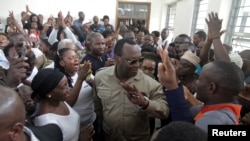Tanzania's main opposition party and rights activists are condemning the arrest of CHADEMA party leader Freeman Mbowe, who faces terrorism charges.
Police on Wednesday arrested Mbowe and 10 other party members as they were about to attend a conference to discuss changes to Tanzania's constitution.
Mbowe was brought before a court in Dar es Salaam Monday to face charges of economic sabotage. He is accused of funding terrorist activities aimed at assassinating government leaders. There has been no comment from the government.
The charges were read out in court, but Mbowe was not allowed to respond.
Opposition supporters and human rights activists condemned what they see as a flagrant violation of Mbowe’s rights.
Rights activist Merciana Mhagama says the entire incident goes against Tanzanian law.
Mhagama says since Mbowe was arrested and taken to court, we have seen a huge abuse of law and principles, but also the incident has gone against freedom of opinion and expression. In a democratic country, we know our constitution allows people to give out their opinion, she says.Another activist, Antele Benjamin, says he is disappointed in seeing Mbowe arrested.
Benjamin says CHADEMA decided to use their constitutional right to demand a new constitution but in return to an unusual situation, we have seen its leader is charged with terrorism-related crimes, something which is a sad thing, and in a civilized society it is something that we didn’t expect to happen.
Police on Tuesday dismissed the accusations that Mbowe's arrest was linked to politics. David Misime is a police spokesperson.
He says Freeman Mbowe knew that he had accusations against him, and he will be held by police for further legal action until the investigation against him is accomplished. He says Mbowe saw it is better to run to Mwanza for the umbrella of constitutional meeting so if arrested, people would believe he was arrested for that, which is not true.
However, political analyst Aika Peter sees Mbowe’s arrest as a threat to democracy in the country.
Democratically with incidents like these, whether it is a message they are trying to send or the message that is there from somewhere that we are no longer safe, said Peter. They are telling us that whatever promises we were told, it was just to please people so as to see we have direction but so far we are back to square one and we have returned to a very bad situation.
Late President John Magufuli, who died in March, was known for running Tanzania an iron-fisted manner. Many activists hoped for a change after President Samia Hassan took over.
Hassan has made a sharp turn on COVID-19 policy, rejecting Magufuli’s belief that the infection did not exist in Tanzania and paving the way for the country to get its first shipment of vaccines.
But she has not embraced political reforms the way some activists were hoping.
On Tuesday, Human Rights Watch said, “Instead of arresting political opponents who are calling for constitutional reform, President Hassan’s government should ... protect everyone’s rights to freedom of expression, association, and peaceful assembly in line with international human rights norms.”





